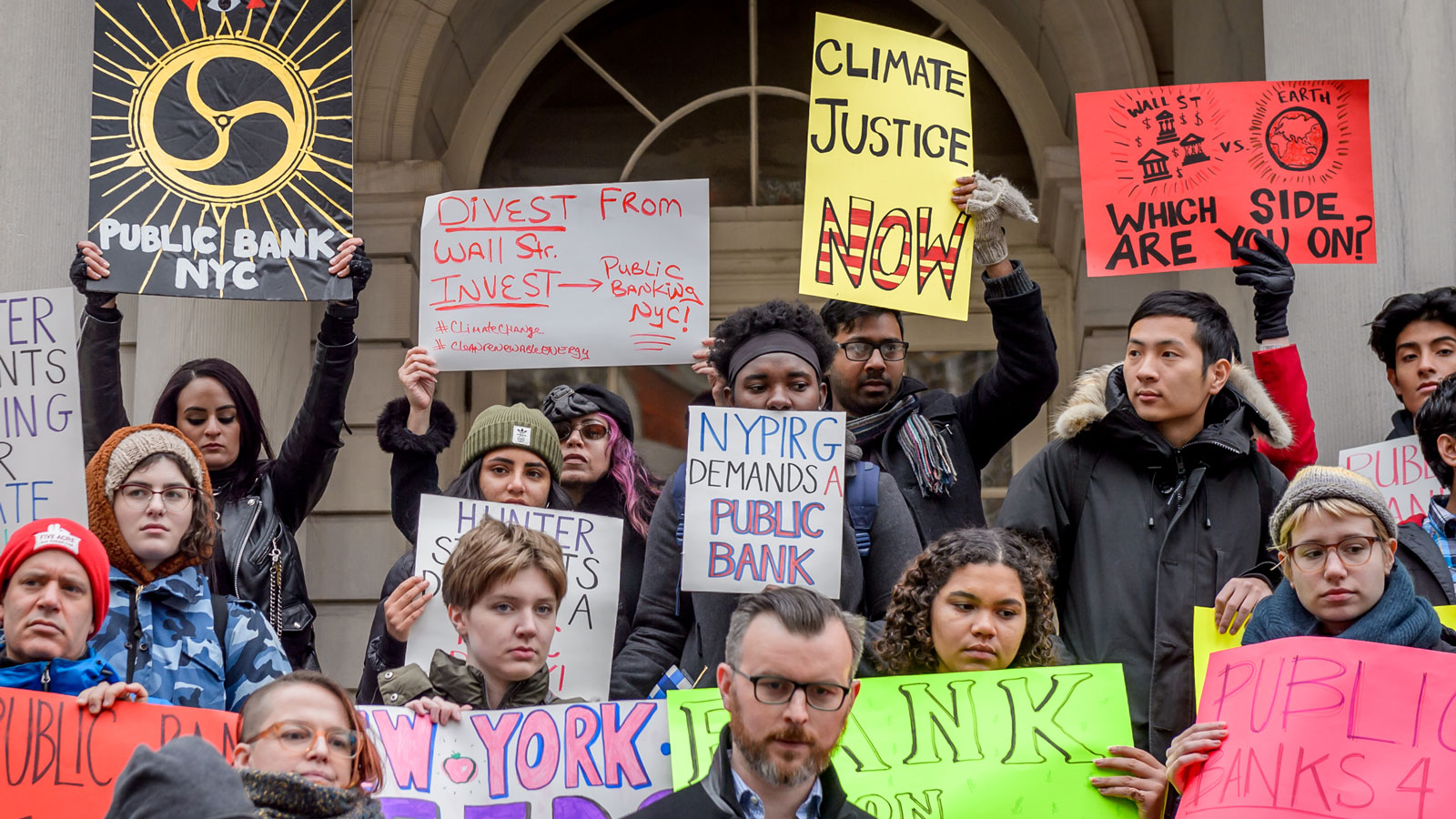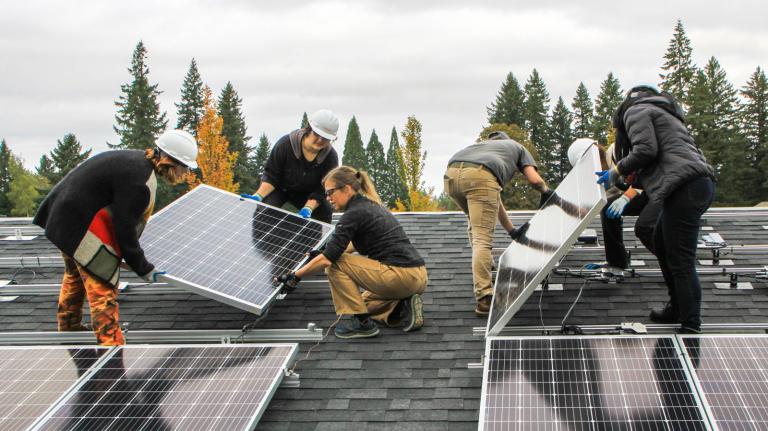Paige Curtis is a Boston organizer with the Massachusetts Public Banking Coalition and a climate writer. Her work has appeared on Vox, GreenBiz, and Yes!.
Throughout the country, states from New York to California are moving to establish state-owned public banks that would serve the public. This is good news for climate justice.
Public banks are funded by a proportion of state tax revenue and mandated by their bank charter to provide flexible, low-cost, and sustainable lending to small businesses, farmers, and nonprofits that traditionally have been excluded from conventional lending. Unlike commercial banks, public banks aren’t beholden to shareholders and aren’t for personal banking; you can’t make deposits there. Instead, imagine a piggy bank that a state (or city) deposits its savings into and uses to dole out low-interest loans, funding projects that serve the public.
There are more than 900 of these institutions globally. But there’s only one in the United States, the Bank of North Dakota, which has a century-long track record of local investments and supporting small businesses and farmers.
While major banks are beginning to embrace sustainable finance, issuing loans for environmental and social impact, change is slow, and it’s unclear whether this funding is reaching the local organizations that need it most. Philanthropic institutions aren’t much help either; just 2 percent of their donations go toward organizations focused on climate and environmental issues. BIPOC-led climate organizations face even steeper funding challenges.
As a Black climate organizer in New England, I hear this frustration often from fellow organizers: Public awareness of climate justice is growing, but where is the money to fund it? Fluctuating government budgets and the patchwork of tax breaks and grants are piecemeal solutions.
“I’ve seen so many advocacy groups with solid, community-informed climate plans that have yet to be funded. These plans are literally sitting on shelves,” says Raya Salter, an attorney who sits on the environmental justice advisory board at the Coalition for Green Capital.
Public banks can also benefit individuals and communities by providing low-interest loans to renewable energy startups, local food entrepreneurs, and farmers deemed unworthy by traditional lenders — those with few assets to serve as collateral or less cash for a down payment. The growing community of Black farmers would especially benefit. After decades of national dispossession and discrimination by the U.S. Department of Agriculture, they are still waiting on $4 billion in debt forgiveness that President Biden promised a year ago. Black entrepreneurs are returning to the agricultural sector, but they need capital to scale their businesses. Large, private banks have a well-known history of discriminatory lending practices, and they tightened lending requirements at the height of the pandemic. As a result, they are approving far fewer loans for small business owners.
[Read: What is heirs’ property? A huge contributor to Black land loss you might not have heard of.]
Public banks operating abroad have long understood the importance of financing green initiatives that struggle to attract capital otherwise. For instance, Germany’s Kreditanstalt für Wiederaufbau public bank is internationally hailed for committing nearly half of its lending, valued at 35 billion euros, to low-carbon projects like retrofitting aging urban buildings for energy efficiency. Banco Popular, a worker-owned public bank in Costa Rica, provides special credit lines for electric taxis, cars, and buses to incentivize consumer purchasing of electric vehicles.
Last winter, I struggled to pay my heating bills after a series of intense snowstorms hit the Northeast — and I wasn’t alone. Roughly 28 percent of U.S. households experience some form of energy poverty and struggle to pay their utility bills. Historically redlined neighborhoods experience disproportionately hotter temperatures, which means higher energy bills on especially sweltering days. Community solar installations (solar panels that produce energy for a community, allowing residents to receive utility credits) are one of many solutions that could help reduce energy bills while allowing communities to pivot away from fossil fuels. Impact investors and community development financial institutions still drive the bulk of clean energy funding; commercial banks are noticeably absent when it comes to funding local projects like community solar.
It’s not that green investments aren’t profitable — the Bank of North Dakota, which invests heavily in such projects, continues to see annual profits in the millions. But their value accrues over many years and is dispersed across whole communities rather than individual shareholders. Because of their mandate, public banks are legally obligated to prioritize social benefit over profit, so unlike conventional banks, they tolerate the long-term horizon that climate-related projects require to demonstrate benefit.
Public banks are legally obligated to prioritize social benefit over profit, so unlike conventional banks, they tolerate the long-term horizon that climate-related projects require to demonstrate benefit.
They may also make communities more resilient when threatened by storms, flooding, or other climate-related disasters, by offering rapid response loan funds, low-interest financing, and special credit lines for emergency services. The Bank of North Dakota has always led disaster-recovery efforts after major flooding and drought events — an immediate lifeline for small agricultural operators.
While public banks are well-equipped to take on problems related to the environment, large private banks can exacerbate them. Cities and states routinely deposit public tax dollars in commercial banks, which, in turn, invest those funds in extractive industries like fossil fuels. In fact, the 60 largest banks in the world have invested $3.8 trillion in fossil fuels since the Paris Agreement.
Here in Massachusetts, the vast majority of state funds — including residents’ public tax dollars — are deposited in the Massachusetts Municipal Depository Trust, with holdings in tobacco companies, oil producers, mining, and everything in between.
“The fight for public banks is really about divesting from extractive, polluting practices and reinvesting in our communities,” says Dwaign Tyndal, executive director of Alternatives for the Community and Environment, Boston’s oldest environmental justice advocacy organization.
The relationship between big banks and fossil fuels helps explain why legislation has been difficult to pass. Between 2011 and 2017, state lawmakers across the country introduced more than 100 public-banking related bills. Yet only California and New Jersey passed laws giving the state (New Jersey) and municipalities (California) the authority to establish public banks. Still, neither state has worked through the committee hearings, community meetings, and business modeling required to establish them.The COVID-19 pandemic hasn’t helped.
While alternative finance does exist for individuals in the form of local banks and credit unions, these institutions operate on a small scale and don’t have the capacity to direct government funding toward climate projects. The banking system is largely opaque to the general population, and the concept of public banks lacks the widespread support and public understanding necessary to make this a legislative and bureaucratic priority.
A 2019 report by the Northeast-Northwest Institute found a phased approach — like passing a feasibility study to explore public banking — produces more legislative activity than bills to establish a public bank outright. This gradual strategy gives policymakers and activists time to run educational campaigns and commission research to demonstrate the benefits of a public bank, increasing the likelihood that one will eventually be created.
Still, states across the country are pursuing public banks. Massachusetts currently has a bill before committee that would establish a public bank, which is due to be voted on by the end of May. If you live in the Bay State, call your local representatives and tell them it’s time to prioritize community over profit. But whatever state you’re in, you can find a local advocacy group through the Public Banking Institute. Let’s stuff our tax dollars in piggy banks that serve the people who need them most.
The views expressed here reflect those of the author.
Fix is committed to publishing a diversity of voices, and we want to hear from you. Got a bold idea, fresh perspective, or insightful news analysis? Send a draft, along with a note about who you are, to opinions@grist.org.



